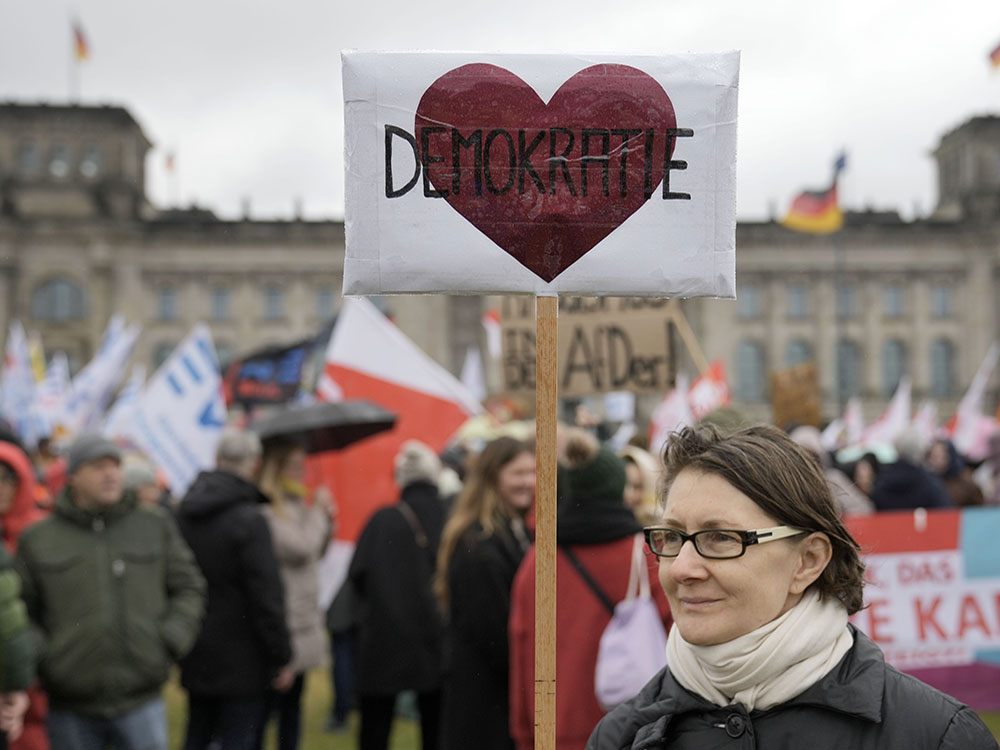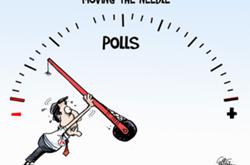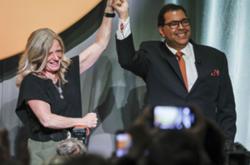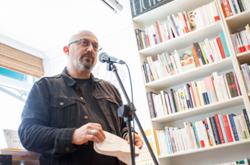Across the world the hard right is moving toward centre stage. The latest sign that liberal democracy is in decline comes from an ocean away. But we in Canada would be fools to believe ourselves safely distanced from that tide.
Earlier this month Europe conducted the second largest democratic vote in the world. Four hundred million voters were eligible to choose who sits in the EU Parliament. The most stunning result was a far-right surge — with immediate and dramatic consequences.
Belgian Prime Minister Alexander De Croo resigned in the wake of the results. His party, Open VLD, won just seven seats, while the two right-wing parties each picked up 20 seats in Belgium’s 150 seat federal parliament. De Croo was left with a one-seat advantage in the seven-member coalition he led and decided that was unworkable.
French President Emmanuel Macron called a snap legislative election for June 30 after his centrist party lost heavily to Marine Le Pen’s far right National Rally party.
Le Pen’s party captured 31.37 per cent of the vote and Macron’s centrist Renaissance coalition only 14.6 per cent. National Rally took 30 seats compared to Macron’s 13. French Finance Minister Bruno Le Maire pronounced: “This will be the most consequential parliamentary election for France and for the French in the history of the Fifth Republic.”
Although the centre-right European People’s Party will remain he largest party in the European Parliament with about 186 of the chamber’s 720 seats, the right is now positioned to be in the running to form governments in France, Italy, Austria, the Netherlands and Germany.
Based on its population, Germany has 96 seats in the EU Parliament. The extreme-right Alternative for Germany, or AfD, won 15 seats, a gain of six seats from the 2019 election. That gives AfD the second highest number of seats in Germany. Chancellor Olaf Scholz’s centre-left Social Democratic Party won only 14 seats. The AfD ran on claims that immigration, refugee and asylum issues are the most urgent problems for the country — a hot button issue across Europe and the United States.
The AfD grew its power despite massive protests against the party and signs it might be losing steam.
Lead candidate Maximilian Krah resigned from AfD’s leadership just before the EU elections because he has been involved in several scandals.
In April, one of his aides was arrested over accusations that he spied for China, and Krah himself was investigated for allegations he had accepted money from Russia and China. Krah had also said in a recent interview with the Italian newspaper La Repubblica that he would “never say that anyone who wore an SS uniform was automatically a criminal.”
Even Marine LePen, the far-right leader in France, decided her party, National Rally, must cut ties, announcing a “clean break” with the German AfD party because of its bold extremism. “The AfD goes from provocation to provocation.”
Nationalist, populist, right-wing parties in the European Parliament have for years roosted together under the pan-European banner of Identity and Democracy. But last month the group expelled AfD, so toxic had it become for even conservative parties to be associated.
Terry Reintke, a lead Green party candidate in Germany for the EU Parliament, predicted the Putin-aligned AfD was on the verge of being halted in its tracks. “They want to destroy the EU and our democracy,” she said. “We will stop them.”
Against all these headwinds, the AfD ran an effective media campaign, attracting young and disenchanted voters to the party.
In the end, it was Reintke’s German Greens who faced a setback, losing nine seats and taking only 11.9 pe rcent of the vote.
Now the AfD is maneuvering to find its way back into the Identity and Democracy coalition. It newly elected members sacrificed the ultra-controversial Kahn, voting to exclude him from their delegation. So far, though, Le Pen is keeping the door shut to AfD.
Meanwhile, there have been other deeply troubling signs in Europe that some people are willing to carry extremism to the limit.
On May 15, Slovakia’s prime minister, Robert Fico, barely survived being shot four times at close range. It was the first attempt to assassinate a European leader in over 20 years. Denmark’s prime minister, Mette Frederiksen, was recently attacked in a busy public square in the centre of Copenhagen.
A US scorched by inflaming rhetoric
While Europe is clearly warming to the right, the pot is on full boil in the United States. Public officials in the U.S. are now regularly threatened. Violence, harassment and threats have become part of the job. Their families are terrified, and some of these public officials have left their posts rather than live under constant threat. Democratic Representative Jamie Raskin played a leading role in Trump’s second impeachment hearing. Since then, he receives 50 threatening calls, emails and letters a month. Threats to his colleagues in congress are up 50 per cent since 2018.
In 2023 more than 450 federal judges in the U.S. were threatened. A Florida man left a voice message vowing to kill Chief Justice John Roberts.
Bomb threats have also closed libraries south of the border for carrying he wrong sort of books.
None of this accidental. It is, in part, blowback from inflammatory political rhetoric. Donald Trump, for example, refuses to rule out violence if he loses the November election. That moves him from being a polarizing figure to an instigator, just as he was on Jan. 6, 2021. He has warned that there will be “death and destruction” if he is jailed over his recent 34-count criminal conviction in the Stormy Daniels hush-money case.
It is a dangerous message. A study released last year showed one in four Americans thought political violence was justified to “save” the country. Among just supporters of Trump the number jumped to four in ten.
Thanks to social media platforms, found another U.S. report on the growing embrace of political violence, there is a great deal of “anonymous rage” out there.
Not only is a convicted felon, sex assailant and tax fraudster positioned to win back the White House, his iconoclasm has apparently turned the GOP into the Lawless and Disorder party.
After Republican congressman Matt Gaetz attended Trump’s hush-money trial in New York last month he posted a photo on social media of fellow congressional Republicans standing behind Trump in the hallway outside the court, writing “Standing back, and standing by, Mr. President.”
It was a clear reference to Donald Trump telling the Proud Boys to “stand back and stand by” in 2020. Membership in the violent, extremist group tripled after that comment, according to testimony at a House committee investigating the Jan. 6 insurrection that attempted to stop the peaceful transfer of power to Joe Biden after he won the election.
Trump has promised to pardon the rioters. He calls them “hostages,” and vows to use the justice department to investigate and punish his political “enemies.”
Trump’s biker logic finds a constituency. Chuck Zito, a former leader of the Hells Angels who spent years in jail on drug charges, joined other Trump supporters at the New York courthouse on May 20. Zito was also an attendee at the funeral of mob boss John Gotti in Queens. Bikers for Trump have taken part in several of the ex-president’s rallies. The subliminal message from Trump, a serial threat-maker, is not difficult to decode.
Joining the Hells Angels and bootlickers at Trump’s trial was Speaker of the House Mike Johnson who brazenly undermined the rule-of-law. With the trail in progress, Johnson declared Trump “innocent of these charges” and after the Trump guilty verdict, called for the U.S. Supreme Court to overturn the jury verdict.
In Canada, the rise of MAGA lite
Canada is far from immune to the powerful currents pulling Europe and the U.S. to the right. We see here the rise of MAGA-lite politics, with Pierre Poilievre at the helm of the Conservative Party of Canada.
During the so-called Freedom Convoy’s assault on the national capital, Poilievre took doughnuts to the truckers and posed for selfies. This was a group whose leaders came to Ottawa with a six-page manifesto to take over the government. Some members also brought swastikas, waved far-right flags, and danced on the Tomb of the Unknown Soldier.
If Canada’s right-wing populism is homegrown, it’s monitored closely by global allies — including Germany’s AfD. Recall that when AfD’s EU Parliament representative Christine Anderson visited Canada during the Trucker Convoy to lend her strong support she had lunch with three Conservative MPs and was presented with an iconic white cowboy hat at the Calgary Petroleum Club.
Does anyone believe that the Conservative claim that they didn’t know a thing about the AfD’s racist policies? Or Poilievre’s claim that the MPs now regret the meeting, even though two remained silent?
Are we really to buy it’s some sort of accident that the right-wing misogynist tag MGTOW, or Men Going Their Own Way, has shown up on their videos?
Are we expected to ignore those far-right Diagolon signs displayed at the “Axe the tax” trailer protest when Pierre Poilievre just happened to drop in for a photo opportunity?
It pays to remember how Poilievre came to lead the CPC. While everyone was glued to the havoc of the Freedom Convoy, a quiet coup of sorts took place. On Feb. 2, 2022, Conservative MPs voted by secret ballot to oust leader Erin O’Toole.
Just four days after the convoy arrived in Ottawa, the moderate Conservative O’Toole was out of his job. Three days later, Pierre Poilievre was in the race to succeed him. With that, the party took a sharp turn to the populist right — Stephen Harper’s old base.
The convoyers’ kingmaking seemed surprising at first for the party of law and order, but it worked. Suddenly the media was paying attention to an MP previously known for his snarky combativeness and dubious support of cryptocurrencies. As NDP MP Charlie Angus told CTV news, “What I find really surprising is the same Conservative MPs who are promoting the convoys against Mr. Trudeau, seemed to have played a role in taking down Mr. O’Toole.”
Surprising indeed. Interestingly, most of the funding for the occupiers of Ottawa came from the U.S. Canada does not usually make headlines on Fox News, but this time Rupert Murdoch’s echo chamber and non-journalist Tucker Carlson flogged the convoy story extensively.
At this moment when Canadians are spellbound by reports that foreign countries have meddled in our politics, it’s worth revisiting a Dec. 13, 2023 Globe and Mail column by Andrew Coyne headlined “Did China and India meddle in the Conservative leadership race?”
Coyne’s question, based on a top-secret intelligence assessment, remains a good one. The Conservative party sold 613,000 new memberships by the cut-off date — more than twice the previous record. Was that a groundswell of support, or a brazen manipulation of the leadership race, which Poilievre won on the first ballot?
The Canadian Security Intelligence Service was apparently watching from the wings and may know the answer. So will the Conservative leadership race, as well as rogue MPs whom NDP Leader Jagmeet Singh has called “traitors,” be the subject of an ongoing inquiry into foreign interference? It should be. A closer look at the rules for federal nomination meetings and the election of riding officials is also in order.
Rule of law as ballot issue
Donald Trump has vowed to bend the justice system and rule-of-law to his will, should he be returned to the White House. What about Conservative Leader Pierre Poilievre?
It’s no idle question. Poilievre recently told a meeting of the Canadian Police Association about his plan to use the notwithstanding clause of the Charter of Rights and Freedoms to stop his government’s laws from being overturned by the courts, the way they often were during the Harper era. It is worth mentioning that no federal government in Canada has ever taken the path the Conservative leader is now espousing on justice issues.
Like Trump, Poilievre has practiced the dark art of patently false grievance politics writ large. He regularly taps far right conspiracy tropes that thrive on social media.
COVID is still a major dog-whistle for the Conservative leader. True, Canada has had a post-COVID affordability problem hitting people where it really hurts: the housing crisis, declining health care, the price of groceries and gas, and homelessness. But these are not made in Ottawa problems. These are problems shared by virtually every other western democracy that had to spend on an industrial scale to fight the pandemic.
Nor is Canada is “broken,” as the opposition leader has said, mimicking Trump’s “American carnage” speech. A recent U.S. News and World report ranked Canada as the second-best country in the world, behind Switzerland and ahead of Sweden.
Canada is also among the top 25-richest countries in the world, even though it does not feel that way for many people. Canada’s inflation rate went down in May to 2.7 per cent, a three year low. This June featured something not seen in four years, an interest rate cut.
Poilievre’s exaggerations about how bad things are in Canada is not his only mimicking of Donald Trump. Charlie Angus, who has been the NDP MP for Timmins-James Bay since 2004, recently wrote in these pages about how the Conservatives are emboldening extremists and undermining democracy.
Part of that goes back to Poilievre’s non-reaction to getting an endorsement from notorious U.S. conspiracy theorist, Alex Jones, who falsely and cruelly claimed the massacre of elementary school children in Sandy Hook, Connecticut was a staged event. Angus, who will not re-offer in the next election, noted, “There was a time when any decent Canadian politician would have gone out of their way to distance themselves from the likes of Alex Jones or Diagolon.”
Angus rightly fears that the “lines between the marginal fringe and mainstream right-wing rhetoric are becoming increasingly blurred.”
When Angus called out Poilievre in Parliament for not distancing himself from Jones, photos of Angus’s daughters were immediately posted online along with their work locations. Straight out of the Trump playbook targeting judges, their kids, witnesses and jurors.
One more thing that Pierre Poilievre shares with populist right-wing parties in both Europe and the United States is his stoking of climate change skepticism and surrender. “Axe the tax” may be a winning political slogan, but it is a foolhardy policy.
So far, Poilievre has not said how he plans to save the planet from global warming, other than bloviating about carbon capture, a process that has not yet been proven to work efficiently on a massive scale. Last month the $2.4 billion carbon capture project by Capital Power Corp. was cancelled by the company.
Poilievre’s insipid climate change comments are blatantly anti-science, mirroring the policies of the Harper era. That is a profoundly dangerous side of right-wing populism.
A recent survey of the world’s top climate scientists shows they expect global temperatures to rise to at least 2.5 C above pre-industrial levels this century. Almost half the scientists believed the number would be at least 3 C, well past internationally agreed upon targets.
The consequences for the planet could be catastrophic. As the Guardian reported, “Many of the scientists envisage a ‘semi-dystopian’ future with famines, conflicts and mass migration, driven by heat waves, wildfires, floods and storms of an intensity and frequency far beyond those that have already struck.”
The climate scientists blame a lack of political will for the crisis. Sixty per cent also blamed “vested corporate interests” such as the fossil fuel industry. Like the 20 fossil fuel executives and lobbyists from the American Petroleum Institute, and others, who went to Mar-a-Lago recently.
Donald Trump, whose motto is “drill baby, drill,” reportedly asked for a billion dollar political donation to his presidential campaign. In return, Trump reportedly promised that if elected he would remove barriers to drilling, end a pause in gas exports, roll back environmental rules and deliver more than 100 billion dollars in tax breaks for the fossil fuel industry.
Here in Canada, no tiny step towards a slight improvement for the environment is too small to become culture warring fodder for Poilievre’s Conservatives. When Tim Hortons experimented with new fibre lids to replace plastic lids at some locations, Ontario Conservative MP Lianne Rood jumped to protest the “woke paper lids.”
Rood said on X: “We’ve overlooked Tim Hortons wacko menu items but now their coffee doesn’t even work like coffee any more.” Wacko. That favourite Trumpian word again. Which happens to be a head-line grabbing, parliamentary rules-violating favourite of Poilievre’s too.
Degrading our political discourse while subverting confidence in basic facts and demonizing those who don’t agree is the hallmark of the hard-right populist style of politics gaining traction across the world. Pierre Poilievre, Donald Trump and their ilk have tapped into something that is both inscrutable and undeniable. They nurture and harvest grievance by offering simplistic scapegoating.
By way of explanation, Margaret Atwood noted an editorial cartoon showing a Handmaid and her daughter who asked her, “But why didn’t you vote against them Mom? Why didn’t you try to stop them from taking it all away?” Handmaid’s answer: “Well back then gas prices were quite high honey….”
The struggle is far from settled, even if the arc of political history seems to be bending away from democracy. In January, millions across Germany filled their city squares to protest the racist, fascist agenda of AfD. They remembered their nation’s dark past well enough to know what is at stake in their own country and elsewhere, including, yes, here in Canada. By their example, they told the rest of us to wake up and raise our voices before it’s too late. ![]()
Read more: Rights + Justice, Politics

















Tyee Commenting Guidelines
Comments that violate guidelines risk being deleted, and violations may result in a temporary or permanent user ban. Maintain the spirit of good conversation to stay in the discussion and be patient with moderators. Comments are reviewed regularly but not in real time.
Do:
Do not: